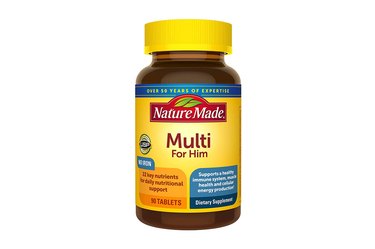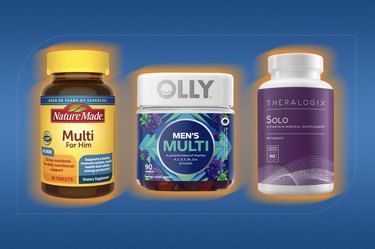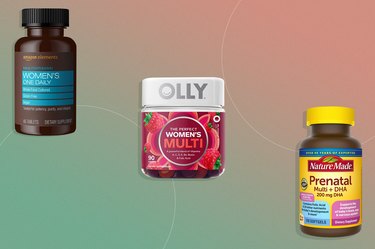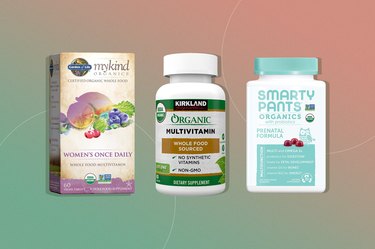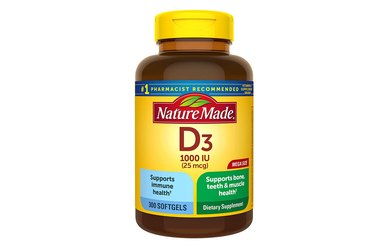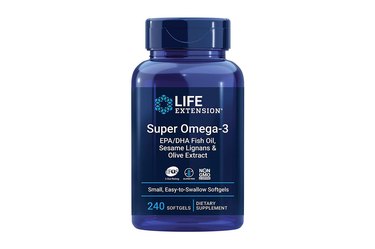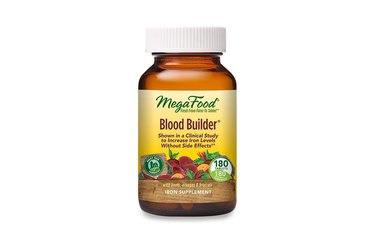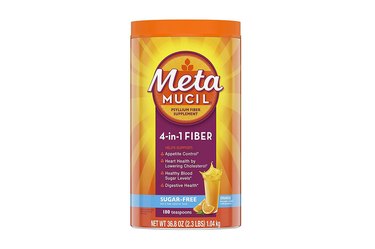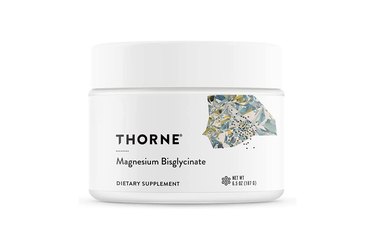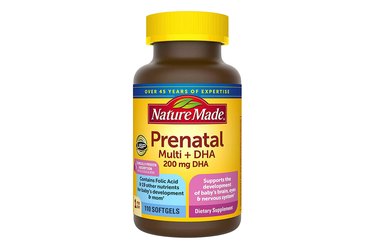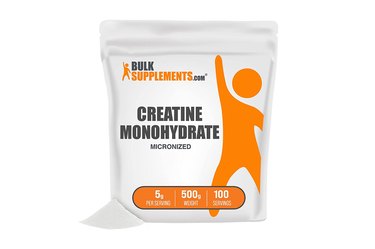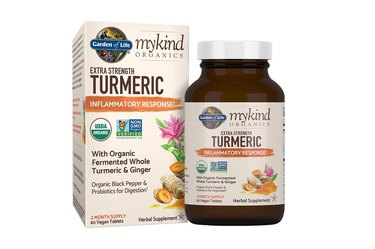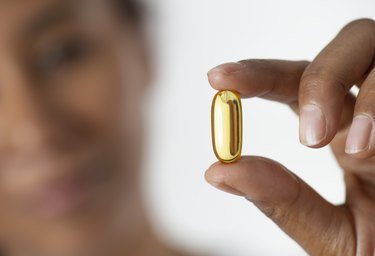
The best way to get all your nutrients is to eat a balanced diet, but when that isn't possible, taking supplements may help.
"Sometimes it's not feasible to get all the nutrients you need through food," says Toby Amidor, RD, CDN, FAND, an award-winning nutrition expert and brand ambassador with CocoaVia. "In those cases, supplementation can help to offset nutritional gaps and keep your body functioning optimally."
Video of the Day
Video of the Day
Many scenarios can lead to a nutritional shortfall, says Laura McDermott, RDN, CD, a dietitian with RET Physical Therapy Group. For instance, during pregnancy, people need greater amounts of certain nutrients. "Supplementation serves as a safety net to ensure the building blocks are available for a healthy pregnancy."
Other common reasons to take supplements include getting older, taking certain medications or following a restricted diet, such as a vegetarian or vegan diet. Take a look at the most recommended supplements.
Warning
Supplements can interact with each other or other medications you may be taking, causing severe side effects. Always talk to your doctor before adding a new supplement to your routine.
How We Chose
Supplement marketing often makes bold claims. That's possible because, unlike prescription medications, the FDA doesn't regulate supplement safety and efficacy. They do, however, establish Current Good Manufacturing Practices (CGMPs) for supplements, including requirements for preparation and storage.
To help us wade through the hype, we asked registered dietitians and a medical doctor for their input on which supplements people may actually need. We also reviewed recent research and guidelines for vitamin and mineral needs.
For specific product recommendations, we included only high-quality brands with products that adhere to CGMP or have verification from independent quality control organizations such as:
1. Best Multivitamin: Nature Made Multi
If you're not eating a diet equipped with enough fruits and vegetables, you could be missing some key micronutrients — that's where multivitamins come in.
"Multivitamins are great because they help to fill in some common nutritional gaps," says Deepti Agarwal, MD, director of interventional and integrative pain management at Case Integrative Health.
Research backs that up: Taking multivitamins has shown to reduce micronutrient deficiencies, per a February 2018 study in Nutrients.
Taking a multi is an easy way to add important nutrients to your diet, Amidor says. "And with nine out of 10 Americans not eating enough fruits and vegetables, it's a great insurance policy," she adds.
One nice thing about multis, McDermott points out, is that you can take them on an as-needed basis. "Multivitamins do not need to be taken consistently to be effective," she says. That is, you can add them to your routine if you're a vegetarian visiting family that tends to put meat on the center of the plate to offset a week where you eat mainly potatoes.
Choosing the best multivitamin for you will depend on your specific diet — a vegetarian may have different requirements, for instance, than a picky eater, while a pregnant person requires a different option than someone over 50.
Plus, multivitamins are often sold as "for men" or "for women," as people have different nutritional needs based on their sex assigned at birth.
- Buy Nature Made Multi for Him: Amazon ($8.69 for 90 tablets); Target.com ($13.99 for 120 tablets)
- Buy Nature Made Multi for Her: Amazon ($13.59 for 90 tablets)
2. Best Vitamin D: Nature Made Vitamin D3
It's not uncommon to fall short on vitamin D, the so-called sunshine vitamin — one out of four people in the United States have levels that are too low, per the National Institutes of Health Office of Dietary Supplements (ODS).
"Vitamin D is acquired through sun exposure, so those of us who live in the northern states or don't get outside frequently (such as those of us who work from home) are often lacking," Dr. Agarwal says.
This shortfall can make a big difference: "Vitamin D keeps your body functioning at its peak by strengthening your teeth and bones, bolstering your immune system and stabilizing your mood, " Dr. Agarwal says.
Even during wintertime, when sunshine is in short supply, you may get sufficient vitamin D from food sources, including fortified foods, McDermott says. But older adults, people with fat malabsorption disease, people with milk allergies or lactose intolerance and vegans and ovo-vegetarians are more prone to a vitamin D deficiency, McDermott says.
"A quick blood test by your doctor can tell if you are taking in enough vitamin D — and if it is low, a vitamin D supplement may be recommended," Amidor says.
Buy it: Amazon ($11.91 for 300 soft gels)
3. Best Omega-3: Life Extension Super Omega-3
Omega-3 is a fatty acid that your body needs but can't make on its own — that is, you can only get it from foods you eat (or supplements), according to the ODS. There are three main varieties of this fatty acid — eicosapentaenoic acid (EPA), docosahexaenoic acid (DHA) and alpha-linolenic acid (ALA).
"If you don't eat foods high in omega-3s (such as fish, seafood, as well as nuts and seeds) at least twice per week, this fish oil supplement could be beneficial," Dr. Agarwal says. Omega-3 fatty acids are being studied for various health benefits, such as cancer prevention and heart health, per the ODS.
4. Best Iron: MegaFood Blood Builder
There are plenty of foods high in iron, although you'll want to avoid eating common foods that inhibit iron absorption — such as eggs — within a few hours of eating them.
But even with the availability of iron through food, some groups experience an iron deficiency, such as people who are pregnant or have heavy periods and people with certain conditions (such as Crohn's or cancer), McDermott says.
Iron deficiency anemia is quite common, according to the American Society of Hematology. It can lead to feeling fatigued, weak, short of breath and many other symptoms. "It is a common scenario in which an iron supplement may be advised," McDermott says.
Plus, vegetarians and vegans may benefit from supplements — the form of iron that's available in plant foods, non-heme iron, is harder to absorb, per the ODS.
One thing to note: Iron supplements may cause digestive issues like constipation. Try a non-constipating iron supplement if this occurs.
5. Best Fiber: Metamucil 4-in-1 Fiber
"Fiber is known to help with bowel movements, but that's not all it does," McDermott says. Along with helping you go, some of the benefits of fiber include the following, according to the Mayo Clinic:
- Lower cholesterol
- Help control blood sugar
- Help cut your risk of heart disease and cancer
- Keeps you full longer, which supports weight loss and maintaining a healthy weight
"Fiber is found in plant foods including whole grains, fruits and vegetables and even nuts and seeds," McDermott says. "But, the traditional American diet is lacking in fiber," she notes. That means despite ample fiber-rich foods, you may still fall short.
"I still encourage you to focus on getting your fiber from nutritious food choices, but it can be advantageous for many people to supplement fiber as well," McDermott says.
Supplementing with fiber is particularly recommended if you have digestive problems (take a look at the best fiber supplements if you have diarrhea), want to lower your LDL cholesterol or are trying to keep your blood sugar levels stable, she says.
6. Best Magnesium: Thorne Magnesium Bisglycinate
Many people in the United States simply do not get enough magnesium, according to the ODS.
"While there are many foods high in magnesium, Americans don't eat enough of those foods because of the alternative, processed foods available to us that are less nutrient-dense," McDermott says.
That shortfall matters because this mineral is important for regulating how your nerves and muscles function, as well as making protein and bone, per the ODS. A magnesium deficiency is more common for people with GI conditions, older adults, people with type 2 diabetes and people with alcohol dependence, McDermott says.
"Magnesium supplements can interact with some medications and cause magnesium toxicity, so as always, talk to your doctor prior to starting," McDermott says. Early symptoms include nausea and vomiting, diarrhea, low blood pressure and muscle weakness, according to the ODS.
Buy it: Amazon.com; Price: $39.60
7. Best Prenatal: Nature Made Prenatal Multi + DHA
If you're pregnant or are planning to try getting pregnant, you might want to consider taking prenatal vitamins. That's because ideally, you'd start getting these nutrients even before you conceive, according to the Mayo Clinic.
Your body's nutritional needs are immense during pregnancy — with your body, you're building a whole new person. Prenatal vitamins include vital nutrients to support fetal development, such as folic acid, iron, calcium and vitamin D, per the Mayo Clinic.
Warning
If you take a prenatal, don’t take other similar supplements such as a multivitamin. “Taking a prenatal along with a multivitamin or a B-complex vitamin can lead to nutrient toxicity," McDermott says.
8. Best Creatine: Bulk Supplements Creatine Monohydrate
Creatine is very popular with athletes, McDermott says. This amino acid is found in foods such as seafood and meat and also produced by your liver, pancreas and kidneys, according to the Mayo Clinic.
"Creatine is an amino acid that helps supply energy to muscles for performance and recovery," McDermott explains. It may improve your athletic performance and increase lean muscle mass, per Mount Sinai.
But it's not just athletes that may benefit from creatine supplementation — it may help support brain health and mood, McDermott says. It may also help prevent injuries and support bone health, according to the Mayo Clinic.
"Reviewing research for groups outside of the typical athletes, this is a supplement that many people can benefit from, particularly older adults," McDermott says.
As for the dosage, older adults are commonly advised to supplement in the short term with 20 grams per day for seven days followed by 10 grams per day for seven days or 20 grams per day for 10 days followed by four grams per day for 20 days. It's best to check with your doctor about the right dose for you.
As a supplement, creatine is most commonly seen as a powder, per Mount Sinai.
Buy it: Amazon.com; Price: $28.96
9. Best Turmeric: Garden of Life MyKind Organics Extra Strength Turmeric
There are many claims about the benefits of curcumin, a compound found in the spice turmeric. "It's a great example of a supplement with a whole-body anti-inflammatory effect," Dr. Agarwal says.
It's true: Curcumin has good anti-inflammatory properties, according to a November 2021 review in Drug Design, Development, and Therapy. The study authors note that the compound can reduce the inflammatory response in people who have conditions such as arthritis, IBD and psoriasis.
That said, the National Center for Complementary and Integrative Health notes that turmeric and curcumin are "challenging to study," and adds that there isn't a clear conclusion about how curcumin benefits many health conditions.
Still, if you have a condition characterized by inflammation, talk to your doctor about whether adding a turmeric supplement is right for you.
Buy it: Amazon.com; Price: $21.69
What to Consider Before Buying Supplements
To help you wade through the available vitamin and supplement options, consider these factors before you buy:
Reputable Brands
Due to lack of FDA oversight, it's important to opt for a reputable brand — look for ones that follow Current Good Manufacturing Practices (CGMPs) and have been certified by third-party organizations such as NSF International or USP, Dr. Agarwal recommends.
Do a bit of investigation: "Read the product's label fully, especially the health claims, and be skeptical of exaggerated or unrealistic claims," Amidor recommends. "Be wary of products supported only by undocumented reports, testimonials from consumers or internal data that is not shared."
You can also visit the manufacturer's website for details on product safety procedures and research about claims. (Be on the lookout for these red flags about supplements, too.)
Ingredient List
If there are certain foods you don't eat due to allergies or a restricted diet — such as soy or dairy — scan the ingredient list to ensure they're not included.
What About Fillers?
Filler ingredients — sometimes called inactive ingredients — protect tablets from breaking, keep moisture out, help supplement absorption or bulk up the pill size, McDermott says. “Filler ingredients in supplements are such a small part, they should only be avoided if you have an intolerance or allergy to something specific."
Dosage
You'll want to make sure your supplement has the right amount of a given nutrient, McDermott says. That way, you can ensure you're not taking too much — or too little.
Speaking to your doctor can help you determine how much you need. You can also lookup the recommended amounts (as well as the upper limit) of specific nutrients on the ODS website.
"When multivitamins have 5,000 percent of the daily recommended amount of a given nutrient, you are creating some expensive urine, and if they are not water-soluble nutrients, you are at risk for toxicity," McDermott says.
Your Doctor's Input
You can purchase a supplement over the counter, but it's best to talk to a physician, dietitian or pharmacist prior to starting one, McDermott says. "Even something like turmeric can be toxic and lead to liver failure if taken improperly."
Many supplements can interact with medications or other supplements, and your doctor can help tailor recommendations based on your lifestyle and medical needs, Amidor points out. (That helps you avoid taking supplements you don't need to spend money on — aka the "expensive urine" problem McDermott mentioned.)
Bottom line: "Be wary of a supplement routine that is overly complex or complicated," Dr. Agarwal says. "While supplements can be a great nutritional addition, they are best used alongside a varied diet, sufficient sleep and movement."
- FDA: "FDA 101: Dietary Supplements"
- FDA: "Current Good Manufacturing Practices (CGMPs) for Dietary Supplements"
- Nutrients: "The Evolving Role of Multivitamin/Multimineral Supplement Use among Adults in the Age of Personalized Nutrition"
- CDC: "Only 1 in 10 Adults Get Enough Fruits or Vegetables"
- Office of Dietary Supplements: "Vitamin D"
- ODS: "Omega-3 Fatty Acids"
- American Society of Hematology: "Iron-Deficiency Anemia"
- ODS: "Iron"
- Mayo Clinic: "Dietary fiber: Essential for a healthy diet"
- USDA: "2020-2025 Dietary Guidelines for Americans"
- Mayo Clinic: "Prenatal vitamins: Why they matter, how to choose"
- Mayo Clinic: "Creatine"
- Mount Sinai: "Creatine Information"
- Drug Design, Development, and Therapy: "Anti-Inflammatory Effects of Curcumin in the Inflammatory Diseases: Status, Limitations and Countermeasures"
- National Center for Complementary and Integrative Health: "Turmeric"
- ODS: "Magnesium"
